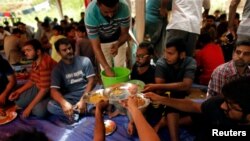Three international human rights groups have joined hands to express concern over a surge in the targeted killings of members of the Ahmadiyya minority community in Pakistan and urged the government to take immediate action.
“Pakistani authorities have long downplayed, and at times even encouraged, violence against Ahmadis, whose rights to freedom of religion and belief are not respected under Pakistani law,” said the press release from Human Rights Watch, Amnesty International and the International Commission of Jurists.
In July, an American citizen of Ahmadiyya faith was shot inside a high security courtroom in Peshawar, the capital of Khyber Pakhtunkhwa province over accusations of blasphemy against Islam. The gunman was taken into custody but members of the security force who came to arrest him were seen taking selfies with him, some of them holding up their fingers in a victory sign.
The gunman was hailed as a hero by many in the local community who went to his house to congratulate his family. Several local lawyers offered to defend him pro bono.
Since then, four more Ahmadiyyas have been gunned down as they went about their daily lives.
The most recent killing happened this month in Punjab province, where a teenager opened fire on 31-year-old doctor Tahir Mahmood and members of his family as he opened the door of his house. Mahmood died while his father and two uncles were wounded.
The perpetrator was taken into custody.
“The recent wave of killings tragically underscores not just the seriousness of the threats they face, but also the callous indifference of the authorities, who have failed to protect the community or punish the perpetrators,” said Omar Waraich, head of South Asia operations at Amnesty International.
Sanaullah Abbadi, the man heading the police in KPK province where four of the five killings happened, said authorities there are investigating the killings.
“We are looking at all aspects, religious persecution as well as personal enmity. I cannot jump to any conclusion because personal enmity is often a cause of violent disputes here.”
He also said he had met representatives of the Ahmadiyya community and assured them of police protection.
“I told them if anyone is under threat, we will provide individual security,” he said.
Pakistan’s human rights minister Shireen Mazari tweeted condemnation of the wave of killings and said the government was taking action.
“Perpetrator of latest attack in police custody & being proceeded against in accordance with law. Govt's duty to protect all r citizens,” her Tweet said.
Tahir Ashrafi, the special representative to the prime minister on religious harmony, also condemned the killings, saying that they would be investigated and that action would be taken against the perpetrators.
HRW’s Waraich said that the killings were most likely a result of repeated hate-mongering against the community.
“What we’ve seen over the last couple of years is a lot of incitement to violence done publicly by armed groups, almost a declared open season on Ahmadis,” he told VOA.
The Ahmadiyyas, who consider themselves to be Muslims, emerged from the Sunni Muslim sect of Islam more than a century ago.
Many Muslims around the world consider them heretics since the founder of the group, Mirza Ghulam Ahmad, declared himself to be the long-awaited messiah of Muslims.
In 1974, Pakistan legally declared them non-Muslim through an amendment to the constitution. Since then, they have faced systematic discrimination.
In the 1980s, Pakistan passed laws that barred Ahmadiyyas from “indirectly or directly posing as a Muslim.” Ahmadiyyas could no longer call their places of worship mosques or use any Muslim religious symbols.
In 2015, the government of the Punjab province banned most Ahmadiyya publications, including children’s magazines, calling them hate speech against Islam.
Anyone applying for identity documents or a passport in Pakistan has to declare his faith. For those claiming to be Muslims, there is an added requirement to declare that they consider the founder of the Ahmadiyya faith to be a false prophet and Ahmadiyyas to be non-Muslim.
Ian Seiderman, legal and policy director at the ICJ, said that in the case of Ahmadiyyas, the Pakistan government had “completely failed” to protect their fundamental freedoms or provide equal treatment under the law.
The laws violate the International Covenant on Civil and Political Rights which Pakistan ratified in 2010, according to the three rights groups.
“Pakistan’s federal and provincial governments should take immediate legal and policy measures to eliminate widespread and rampant discrimination and social exclusion faced by the Ahmadiyya community in Pakistan,” said Patricia Gossman, associate Asia director at Human Rights Watch.




